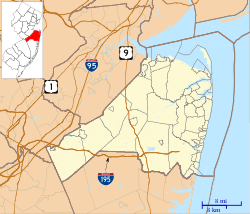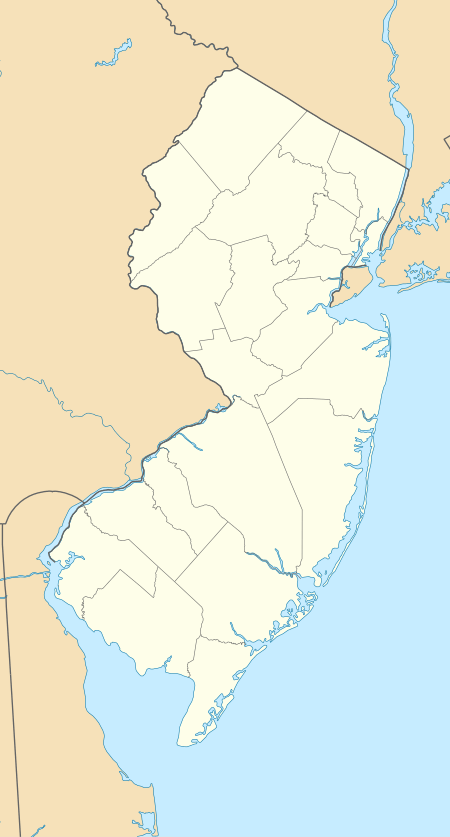Parker Homestead
The Parker Homestead is a historic home and grounds in Little Silver, Monmouth County, New Jersey, United States, located at 235 Rumson Road near Sickles Park. The main house was originally built circa 1720, and includes materials from an earlier structure (c. 1667) the early and late 19th century, and the 1910s and 1920s.[1] It is one of the oldest extant buildings in the state. The farmstead which also includes also three outlying barns were listed on the New Jersey Register of Historic Places[5][6] and the National Register of Historic Places.[7] in 2011.
Parker Homestead | |
   | |
| Location | Rumson Road, Little Silver, New Jersey |
|---|---|
| Coordinates | 40°20′36″N 74°3′26″W |
| Area | 11 acres (4.5 ha) |
| Built | 1720[1][2] |
| Architectural style | Vernacular |
| NRHP reference No. | 11000966[3] |
| NJRHP No. | 2000[4] |
| Designated NJRHP | October 16, 2011 |
Original settlers
Little Silver was settled by two of the original patentees of Shrewsbury Township,[8] one of the earliest English-speaking settlements in New Jersey[9] Brothers Joseph and Peter Parker settled in the area in 1667 and owned land bounded by Parker's Creek on the south and Little Silver Creek on the north, named their holdings "Little Silver" after their father's (George Parker) estate in Portsmouth, Rhode Island.[10] The farm remained in the family until the last descendant of the original settlers, Julia Parker, died in 1995.[11]
Acquisition and preservation
After Julia Parker died the homestead was acquired by the borough, through her bequest, with the condition that it be preserved. Studies are being conducted as to how to proceed with restoration of the property. The Garden State Historic Preservation Trust Fund awarded a $44,625 grant for the site and local authorities used that money for preliminary preparations and consultant fees to outline a plan for future work and use of the historic property.[12][13] The condition of the buildings are considered precarious and immediate stabilization is considered a priority.[14]
In the Summer of 2013 an Eagle Scout project was conducted to clear invasive and obtrusive plants from the area surrounding the pond next to the house.
References
- "NJ's oldest home? Parker Homestead in Little Silver predates founding of U.S." NJ.com. Retrieved November 15, 2017.
- "Historic Houses". Monmouth County Historical Society. 2011. Archived from the original on July 27, 2011. Retrieved April 11, 2011.
- "National Register Information System". National Register of Historic Places. National Park Service. March 13, 2009.
- "New Jersey and National Registers of Historic Places - Monmouth County" (PDF). New Jersey Department of Environmental Protection - Historic Preservation Office. p. 12. Archived from the original (PDF) on December 2, 2007. Retrieved March 1, 2012.
- "Parker Homestead makes New Jersey Register of Historic Places". littlesilver.patch.com. Retrieved February 11, 2012.
- "New Jersey Department of Environmental Protection - Historic Preservation Office" (PDF). NJ.gov. Retrieved November 15, 2017.
- "Parker Homestead in Little Silver put on National Register of Historic Places". Asbury Park Press. February 22, 2012. Retrieved March 2, 2012.
- "Peter Parker (c.1635 - d.) - Genealogy". Geni.com. September 14, 2011. Retrieved March 2, 2012.
- "Middletown and Shrewsbury" (PDF). Using the Records of East and West Jersey Proprietors. www.nj.gov/state/darm. Archived from the original (PDF) on January 26, 2012. Retrieved March 1, 2012.
Middletown & Shrewsbury, 1665 (a.k.a. Navesink or Monmouth Patent) – In April 1665, twelve men, principally from Long Island, obtained a triangular tract from Governor Nicolls extending from Sandy Hook to the mouth of the Raritan River, up the river approximately twenty-five miles, then southwest to Barnegat Bay. The area was first known as Navesink, then Middletown and Shrewsbury County, and finally in 1683 as Monmouth County. Founders were mostly Baptists and Quakers. Purchasers at Middletown and Shrewsbury subscribed £3 or £4, which entitled them to 120 acres with additional increments for wives and children, and 60 acres for each servant. As many as eighty families arrived from Long Island, Rhode Island and Massachusetts during the first years. Quaker meetings were established by 1670. Settlers understood their patent to have endowed them with a right of government.
- Goodnough, Abby. " If You're Thinking of Living in/Little Silver; Life on a Peninsula Near Sandy Hook", The New York Times, October 17, 1993. Accessed June 8, 2007. "Little Silver was settled in 1667 by Joseph and Peter Parker, who named their property for their father's Portsmouth, R.I., estate."
- "Parker Homestead-1665 begins historic preservation". Themonmouthjournal.com. July 15, 2009. Retrieved March 24, 2012.
- "Parker Homestead". Small Public Spaces. Heritage Landscapes. Retrieved February 10, 2012.
- "Parker Homestead Plan Advances". RedBankGreen. July 21, 2008. Retrieved March 2, 2012.
- "Buildings at Parker Homestead unsafe officials say". littlesilver.patch.com. Retrieved February 10, 2012.
